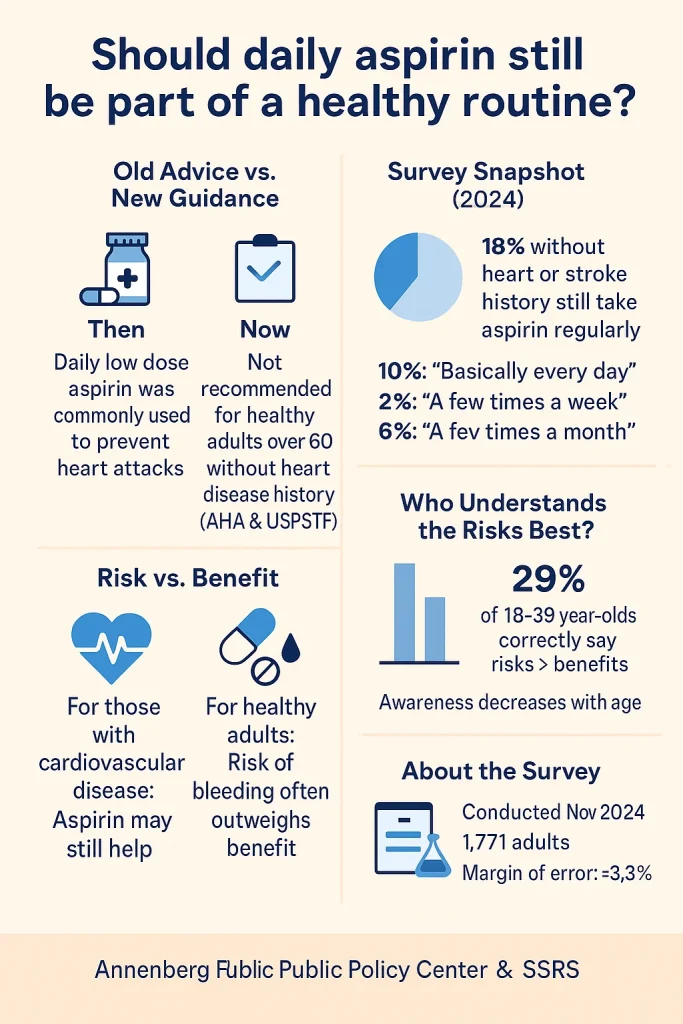Rethinking Daily Aspirin: What Every Adult Should Know
Wondering if daily aspirin is still a smart choice for a healthy heart? Discover the latest science says now!

Daily aspirin use continues among many older adults, despite updated guidelines advising against it for those in good health. It was found in a recent survey that 18% of individuals without prior heart disease or stroke still take aspirin routinely. This persists even though, for most, the potential harms have been shown to outweigh the expected benefits.
For many years, low-dose aspirin was commonly recommended to healthy older adults as a way to lower the chance of heart attacks. That guidance changed in March 2019, when the American College of Cardiology and the American Heart Association updated their recommendations. Daily aspirin use is no longer advised for healthy individuals over 70, as the risk of gastrointestinal bleeding has been shown to outweigh the potential benefits.
Even with the updated advice, awareness remains limited.
According to a health survey conducted by the Annenberg Public Policy Center at the University of Pennsylvania, nearly half of adults in the U.S. still believe that daily low-dose aspirin offers more protection than risk for most people.
Overall, close to 1 in 5 adults without a personal or family history of heart attack or stroke report regular use of low-dose aspirin. Of that group, 10% take it “basically every day,” 2% “a few times a week,” and 6% “a few times a month.”
In the past, low-dose aspirin was widely used because of its ability to thin the blood and reduce clotting, which can block arteries and trigger heart attacks or strokes. This approach remains a key prevention strategy for individuals diagnosed with cardiovascular disease who are not at increased risk for bleeding complications.
However, expert guidance for healthy adults has evolved. In 2022, following the updated 2019 recommendations from the American Heart Association, the U.S. Preventive Services Task Force advised against starting low-dose aspirin for the primary prevention of cardiovascular disease in adults aged 60 and older without a history of heart-related conditions or symptoms.
“Habits backed by conventional wisdom and the past advice of health care providers are hard to break. Knowing whether taking a low-dose aspirin daily is advisable or not for you is vital health information.”
Kathleen Hall Jamieson, director of the Annenberg Public Policy Center
According to the survey, 45% of adults report that a heart attack or stroke has occurred in their family, while 49% indicate no such history, and 6% remain uncertain. Data from a 2024 report by the American Heart Association estimates that 3.1% of individuals aged 20 and older have experienced a heart attack, 3.3% have had a stroke, and more than 48% are living with some form of cardiovascular disease, including coronary heart disease, heart failure, stroke, or high blood pressure.
For those with a previous heart attack or stroke, low-dose daily aspirin may still be recommended by healthcare providers. Individuals aged 40 to 59 with a 10% or greater chance of a cardiovascular event within the next decade may also receive this advice, based on current guidelines.
Despite this, the survey reveals that 18% of adults with no history of heart attack or stroke continue to take low-dose aspirin regularly. Among this group, 43% believe that, for most adults, the benefits of daily aspirin outweigh the risks.
Within this same group, younger adults tend to have a better understanding of the current recommendations. Among those aged 18 to 39 without a relevant medical history, 29% correctly identify the risks of daily aspirin as greater than the benefits. This compares with 11% of those aged 40 to 59 and just 7% of those 60 and older—suggesting that earlier medical advice may still influence long-held habits.

The data were collected during the 22nd wave of a nationally representative panel survey involving 1,771 adults in the United States. The survey was conducted by SSRS, an independent research organization, on behalf of the Annenberg Public Policy Center. Most participants have been part of the panel since April 2021. To maintain representation, additional participants were added over time through random sampling methods. The latest group, added in September 2024, included 360 new respondents.
This wave of the Annenberg Science and Public Health Knowledge (ASAPH) survey was conducted from November 14 to 24, 2024. The reported margin of sampling error is ± 3.3 percentage points at a 95% confidence level. Figures are rounded to the nearest whole number, which may result in totals that do not equal exactly 100%.
